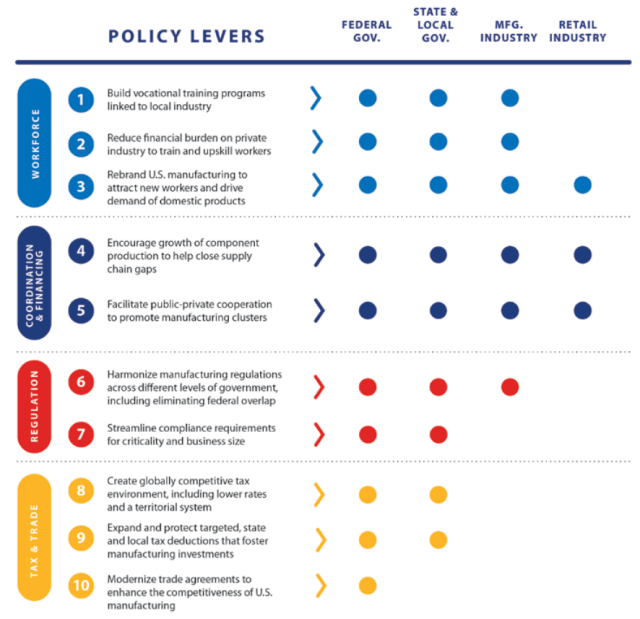
Posted on 07/31/2017 2:00:01 PM PDT by 2ndDivisionVet
Revitalizing American manufacturing has been a hot topic for some time, gaining prominence as a talking point in last year’s election. Donald Trump’s victory led many to speculate about the future of manufacturing in the U.S., particularly whether it’s possible to bring manufacturing back to America. The latest piece of advice on this topic comes from a rather surprising source: Walmart.
The retail giant recently convened a meeting of representatives from governments, businesses and non-governmental organizations (NGOs) to present a Policy Roadmap to Renew U.S. Manufacturing.
“As we’ve worked over the last four years alongside our suppliers toward our goal to source an additional $250 billion [USD] in products that support American jobs, we’ve learned a great deal about the challenges our suppliers face in domestic manufacturing,” said Cindi Marsiglio, Walmart vice president for U.S. Sourcing and Manufacturing. “The good news is we’ve also learned how to overcome the challenges and, because of our experience, Walmart is uniquely positioned to help facilitate broad engagement in accelerating the expansion of U.S. manufacturing.”
Before proceeding to the specifics of Walmart’s roadmap, it should be noted that a 2015 study by the Economic Policy Institute estimated that Walmart displaced over 400,000 jobs in the United States between 2001 and 2013 as a result of Chinese imports. The majority of these jobs were in manufacturing.
In 2013 alone, the value of Walmart’s imports from China amounted to approximately $45 billion; this is the same year Walmart committed to sourcing an additional $250 billion over the next decade on products that support American jobs.
Irony aside, Walmart’s policy roadmap cites four major barriers to U.S. manufacturing growth: 1.Lack of an available, qualified workforce. 2.Lack of coordination and financing in supply chains. 3.Complexity and costs of local, state and federal regulations. 4.Outdated tax system and trade agreements.
According to an analysis conducted by The Boston Consulting Group (BCG), addressing these policy barriers to domestic manufacturing creates an opportunity to recapture approximately $300 billion in consumer goods that are currently imported, including furniture, cookware and sporting goods, potentially resulting in the creation of an estimated 1.5 million American jobs.
Walmart’s roadmap includes ten “policy levers” to address the major barriers to U.S. manufacturing growth. Some, like altering trade agreements, can only be addressed at the federal level. Others, such as encouraging the growth of component production to help close supply chain gaps, require the cooperation of all levels of government, as well as manufacturers and retailers.

Many of the proposals for improving U.S. manufacturing are sensible and relatively straightforward. To take one example, in order to address the lack of an available, qualified workforce, the roadmap suggests rebranding American manufacturing to attract a new generation of workers and drive demand for American products.
For federal, state and local governments, this means allocating funds for manufacturer-run youth programs and career development initiatives. For manufacturers, it means developing youth engagement and public awareness campaigns to instill a positive image of manufacturing careers. For retailers, it means making and publicizing sourcing commitments to U.S. manufacturing.
Regardless of whether its projected monetary and vocational gains are realistic or its source is genuine in its enthusiasm for American manufacturing, Walmart’s roadmap does get one thing right: renewing U.S. manufacturing requires cooperation across the public and private sectors, from local governments to multinational retailers.
What’s your opinion on Walmart’s proposals for American manufacturing? Share your thoughts in the comments below.
Interesting to know. I remember when Walmart (seemingly overnight) replaced all of the RM products with Stearlite plastic products.
I recently tried to give Sam’s Club some business on a few somewhat pricy portable printers. I went to the store for pick up at “In Club Orders” kiosk (which wasn’t a kiosk, at all...just a bunch of disorganized shopping carts).
They messed up the order so badly....couldn’t even locate it. I told them I would return in a few hours to see if they’d located them. An hour later they sent me a cancellation email to kindly let me know my order was cancelled.
NEVER, again will I do business with them. Especially with a Costco just a couple of blocks further.
I don’t blame you.
We don’t have Costco around here.
I pay more to shop with local merchants rather than support the Walton clan.
Sam Walton is probably spinning in his grave.
Disclaimer: Opinions posted on Free Republic are those of the individual posters and do not necessarily represent the opinion of Free Republic or its management. All materials posted herein are protected by copyright law and the exemption for fair use of copyrighted works.